

August 2000
Tuesday 8th August 2000
On Saturday evening Yuki and I visited her parents' apartment in north west Tokyo. It was a bit of a family gathering with Yuki's sister, brother-in-law, niece and nephew also there. The occasion was the Itabashi firework festival. We were due to watch it from the top of their apartment block, but the caretaker had gone off with the key! We watched from as high as we could, then took a stroll to a nearby bridge to watch the conclusion. The rain held off just long enough for the fireworks, but not long enough for me to get home. I am very much enjoying becoming part of Yuki's family. They are all so friendly, and despite the language barrier, we manage to get on well. I was particularly pleased by the way Yuki's nephew took to me. Surely that must give me some brownie points in the "fit to be a father" stakes! On the way home I saw many girls who'd got soaked through in their yukatas. A Yukata is a summer kimono that girls dress up in for special occasions.
 On
Sunday morning we went to the Tokyo Dome (Suidobashi Station on the Mita subway
line) to watch the "American Bowl". This is a game of American football, played
annually in Japan to promote the sport. I don't think the sport is very popular
in Japan, especially judging by the half full stadium (I'm an optimist)! It
was my first game of American Football and I enjoyed it.
On
Sunday morning we went to the Tokyo Dome (Suidobashi Station on the Mita subway
line) to watch the "American Bowl". This is a game of American football, played
annually in Japan to promote the sport. I don't think the sport is very popular
in Japan, especially judging by the half full stadium (I'm an optimist)! It
was my first game of American Football and I enjoyed it. 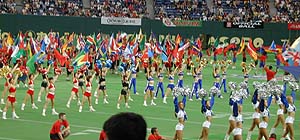 The
half time show was a bit of an extravaganza too. What made it even better
was the half-priced tickets I bought off a tout outside the ground! Only fourteen
rows back from the corner flag. Do they have a flag? Anyway, fourteen rows
back from the corner of the end zone. The game was between the Dallas Cowboys
and the Atlanta Falcons. The team I supported lost, of course. Dallas 9, Atlanta
20.
The
half time show was a bit of an extravaganza too. What made it even better
was the half-priced tickets I bought off a tout outside the ground! Only fourteen
rows back from the corner flag. Do they have a flag? Anyway, fourteen rows
back from the corner of the end zone. The game was between the Dallas Cowboys
and the Atlanta Falcons. The team I supported lost, of course. Dallas 9, Atlanta
20.
 After
the football, we visited a small theme park adjacent to the "Big Egg", Korakuen
Park. It was not impressive enough for a day trip, but fine to while away
a couple of hours after the game.
After
the football, we visited a small theme park adjacent to the "Big Egg", Korakuen
Park. It was not impressive enough for a day trip, but fine to while away
a couple of hours after the game.
This morning I had a Japanese lesson. I've been taking a lesson almost every week, and recently decided to try for this year's proficiency test. I'm under no illusions that I even approach being proficient, but It'd be nice to have some formal reward for that which I am learning. It's not going to be easy. I am very bad at reading kanji, the characters of Chinese origin, to mention but one weak point! The tests are held every December and rank from level four, the least difficult (not such an optimist now), up to level one. I have no ambition to get any more than level four. In England a certificate saying you have Japanese language ability is exceptional, no matter what the number!
Wednesday 16th August 2000
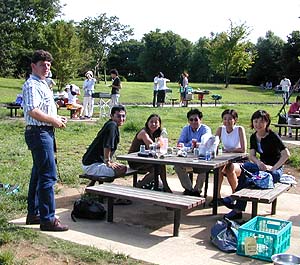 On
Saturday Yuki and I joined five other friends for an afternoon barbecue in
Kasai Rinkai Koen, a huge park near Tokyo Disneyland. The barbecue facilities
and food are all provided (for a fee). This was followed by yet another evening
of karaoke.
On
Saturday Yuki and I joined five other friends for an afternoon barbecue in
Kasai Rinkai Koen, a huge park near Tokyo Disneyland. The barbecue facilities
and food are all provided (for a fee). This was followed by yet another evening
of karaoke.
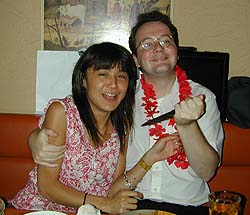 Last
night was the first of two parties arranged to celebrate my colleague Marlon's
birthday. It was enjoyable and included a tasty Indian meal in the Rasoi restaurant,
next door to the Tavern pub, in Meguro.
Last
night was the first of two parties arranged to celebrate my colleague Marlon's
birthday. It was enjoyable and included a tasty Indian meal in the Rasoi restaurant,
next door to the Tavern pub, in Meguro.
I hesitate to write the next part of this entry because it is just a reflection of how I feel now, and not necessarily a true reflection of my feelings in general. However, I think for the record I should continue, as to leave it out would be a disservice to this journal's purpose.
Things are going fairly well for me in Japan. I have a wonderful girlfriend, a good job, nice apartment and many friends. But, right now I am feeling less than overjoyed with my situation. I have reached a stage where some aspects of living in Japan are getting to me.
I have developed a major dislike of the way one is always being told what to do in Japan. It seems everywhere I go, there is someone shouting inanely at people to do something or other. There will be people with loud hailers talking incessantly at members of the public, telling them to do what they are doing anyway! I don't understand most of what's being said, but still manage perfectly well.
When you walk into a pub, you are nearly always asked how many of you there are, then told where to sit. What business is it of theirs how many of us there are? If they really want to know they can count us!
When you get on a train, even a subway train, you are given instructions as to what you should and should not do, and how to behave. It's mind-numbing!
I find myself tempted to go against the system. This gets little or no reaction, but it helps me remember that I am not a subject of a communist dictatorship.
As you enter a shop the staff all shout "Irashaimase" at you. This means welcome, and were it not for the fact of the twenty-four hour verbal onslaught elsewhere, it would be quite pleasant. When you leave a shop, whether you bought anything or not, you will get "Arigato gozaimashita" (thank you) shouted at you a few times. Don't think it necessary to answer or even acknowledge these statements, as it's not at all expected, and would probably confuse the shop assistant. He's probably on autopilot and didn't even register he'd said it!
Bureaucracy is another thing that's frustrating in Japan. I have to write my name and address six times on the same form to apply for my Japanese test!
The novelty of living away from my own country has also worn off. I don't wish to return home early, but I do look forward to that day arriving eventually.
One more thing that adds to this negative view of life, is the way the Japanese accept all of the needless bureaucracy and instruction to which they are subjected. I think to myself "Why do you allow yourselves to be treated like children, when you are independent adults?" Of course to the Japanese, this is the normal way of things and they see it as helpful service, not unnecessary oppression!
I haven't forgotten that it's me who's the stranger here, and as I said above, this is surely a phase I will deal with, and hopefully emerge refreshed from, but to ignore it would be to deny it's existence. In fact I'm already feeling better, just having got it off my chest!
Monday 21st August 2000
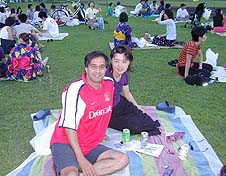 Having
missed last weeks fireworks festival (hanabi), we went along to one this week
in Futago-Tamagawa. This is a big recreation area alongside a Tokyo river.
We spent the afternoon having a picnic along with thousands of other people.
When the Japanese have these big events,
Having
missed last weeks fireworks festival (hanabi), we went along to one this week
in Futago-Tamagawa. This is a big recreation area alongside a Tokyo river.
We spent the afternoon having a picnic along with thousands of other people.
When the Japanese have these big events, 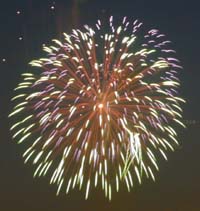 there
is never any shortage of food or drink available, so you really don't need
to worry about preparing your own. Don't expect to leave quickly after a hanabi
festival finishes. They really draw big crowds, many, especially the girls,
in their traditional summer outfits.
there
is never any shortage of food or drink available, so you really don't need
to worry about preparing your own. Don't expect to leave quickly after a hanabi
festival finishes. They really draw big crowds, many, especially the girls,
in their traditional summer outfits.
>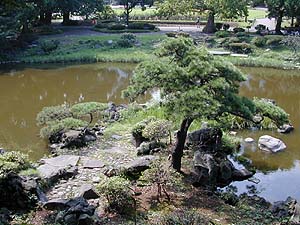 On
Sunday, we took a short trip to Hibiya Park, near my home. It's wonderful
the way such a beautiful green space can exist in the middle of Tokyo. One
section of this park is a nice example of a Japanese garden, complete with
huge koi carp, and I mean huge.
On
Sunday, we took a short trip to Hibiya Park, near my home. It's wonderful
the way such a beautiful green space can exist in the middle of Tokyo. One
section of this park is a nice example of a Japanese garden, complete with
huge koi carp, and I mean huge.
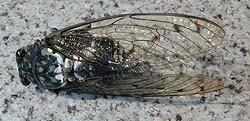 Another
huge thing in great evidence in Japan now, particularly in areas with more
trees, is the "semi". A semi is a type of flying insect, known as a cicada
in English. They don't tend to fly around very much. Their life story, as
I understand it is that they live underground as some sort of embryo or pupa
for a few years, then they crawl up into the trees, develop wings, sing like
crazy for a mate, and a few days later fall to the ground dead! The "singing"
is reminiscent of the sound a small high speed handheld grinder makes. Well
something like that, anyway. This noise lasts a few weeks every summer in
Tokyo, then the rest of the year, aside from the not inconsiderable noise
of traffic and crows, it's pretty quiet! On the subject of crows, there were
"beware of the crows" signs in Hibiya Park. These crows too, are pretty enormous!
Many people are scared of them. I think they are magnificent creatures, completely
black and perfectly groomed.
Another
huge thing in great evidence in Japan now, particularly in areas with more
trees, is the "semi". A semi is a type of flying insect, known as a cicada
in English. They don't tend to fly around very much. Their life story, as
I understand it is that they live underground as some sort of embryo or pupa
for a few years, then they crawl up into the trees, develop wings, sing like
crazy for a mate, and a few days later fall to the ground dead! The "singing"
is reminiscent of the sound a small high speed handheld grinder makes. Well
something like that, anyway. This noise lasts a few weeks every summer in
Tokyo, then the rest of the year, aside from the not inconsiderable noise
of traffic and crows, it's pretty quiet! On the subject of crows, there were
"beware of the crows" signs in Hibiya Park. These crows too, are pretty enormous!
Many people are scared of them. I think they are magnificent creatures, completely
black and perfectly groomed.
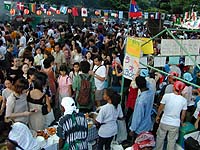 Later
we went to Azabu Juban, between my home and Roppongi. This was to visit the
Azabu Juban Nouryo Matsuri, which is a big street festival. There were many
stalls selling traditional Japanese food and crafts, as well as performances
by Japanese entertainers. There was also an international bazaar area providing
a taste of food from around the world.
Later
we went to Azabu Juban, between my home and Roppongi. This was to visit the
Azabu Juban Nouryo Matsuri, which is a big street festival. There were many
stalls selling traditional Japanese food and crafts, as well as performances
by Japanese entertainers. There was also an international bazaar area providing
a taste of food from around the world. I took a look at the British stall and asked how our food was going down in
Japan. The guy told me in a broad Australian accent that the pasties were
selling well, completely mispronouncing the word "pasties". These are desperate
times indeed if we can't find a Brit in Tokyo to represent the nation (there
are over nine thousand of us). Should I write to the Ambassador? Actually,
I heard today that a Swedish colleague of mine is seeing a Japanese girl who
works at the British Embassy! I could get my message through that way!
I took a look at the British stall and asked how our food was going down in
Japan. The guy told me in a broad Australian accent that the pasties were
selling well, completely mispronouncing the word "pasties". These are desperate
times indeed if we can't find a Brit in Tokyo to represent the nation (there
are over nine thousand of us). Should I write to the Ambassador? Actually,
I heard today that a Swedish colleague of mine is seeing a Japanese girl who
works at the British Embassy! I could get my message through that way!
Another thing I found odd at the festival was that there were stalls openly allowing young children to buy fireworks. An absolute no-no in the UK.
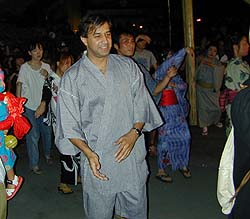 Later
in the evening I took part in the "Bon-Odori", a Japanese traditional dance.
I'd earlier bought myself a men's yukata (light summer outfit), so although
being a fumbling beginner, at least I looked the part! Well, I say I looked
the part, I also had this strange suspicion that I was acting like a complete
tourist. The proportion of western men in yukatas was much higher than that
of Japanese men!
Later
in the evening I took part in the "Bon-Odori", a Japanese traditional dance.
I'd earlier bought myself a men's yukata (light summer outfit), so although
being a fumbling beginner, at least I looked the part! Well, I say I looked
the part, I also had this strange suspicion that I was acting like a complete
tourist. The proportion of western men in yukatas was much higher than that
of Japanese men! 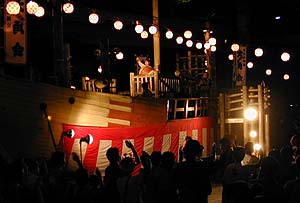 Bon
dances are performed each year at this and many other festivals. Bon is a
Buddhist festival to welcome back the spirits of the dead. Three days later,
when the celebrations are over, they are expected to go back to their resting
places. Many Japanese return to their ancestral homes during this time.
Bon
dances are performed each year at this and many other festivals. Bon is a
Buddhist festival to welcome back the spirits of the dead. Three days later,
when the celebrations are over, they are expected to go back to their resting
places. Many Japanese return to their ancestral homes during this time.
Something else I've been busy with lately is discovering what needs to be done to comply with several governmental requirements, both Japanese and British. I've found a lot of good information from web sites including those of the British Consulate and the British Home Office. So far I've managed to find out that Yuki is entitled to live in Britain as my wife, and that after three years she can apply to become a naturalised UK citizen. I've also looked at the less than simple procedure of registering a marriage with the Japanese and UK authorities. I was surprised to find the wedding ceremony in Japan is purely of celebratory significance. It has no legal meaning. The wedding is legalised in a local government office, similar to a British registry office, but without any ceremony, flowers or guests. Lastly, I was extremely pleased to read that a Japanese person with a full driving license can simply swap it for a British one. Probably partly due to the Japanese driving on the civilised side of the road (the left).